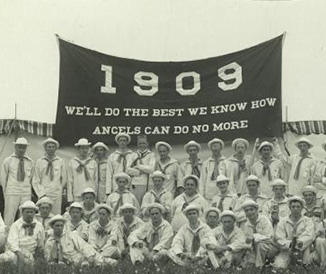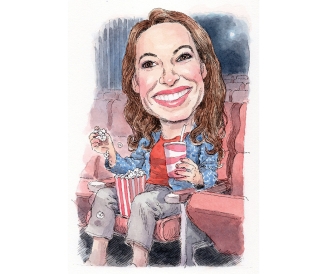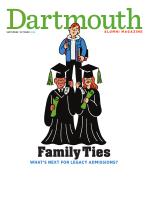
Love and Empire
I was in the bedroom of my Sachem Village cinder-block house reading John Donne in my fat, green Witherspoon and Warnke anthology when the troubling call came through. My son John Michael, just 3 months old, was beside me on my futon.
At first glance I looked like any other student in an oversized Champion sweatshirt with Dartmouth logo, leggings, Keds and a Kelty backpack that held a Walkman and spiral notebook along with my textbooks. However, there was the matter of the baby, born only last term. There was also the matter of his father, John, a ’90 whose ROTC scholarship meant that he was now a second lieutenant, Armor, on active duty. My choice when we got unexpectedly pregnant during my freshman year was to say yes to every option: Marry John, keep our baby and continue my education. The sweatshirt-and-Walkman normal student look was just so much window dressing.
I don’t think the architects of Dartmouth’s D-Plan had taking time off to deliver a baby in mind when they came up with the leave term, but for me it worked out perfectly. I did my sophomore fall at Dartmouth, hiding my pregnancy under John’s rugby shirts and going to the Mary Hitchcock Memorial Hospital for prenatal checkups in between classes. When I finished my last exam I didn’t go home to my grandparents, sister, mom, dad and high school friends in Wyoming as I had the previous year. Instead, I joined John at Fort Knox, where he was midway through the Armor Officer Basic Course.
It was early 1991 and the military buildup to the first Gulf War was in full swing. There wasn’t much for me to do but worry about whether John would be sent over. I didn’t know any women in the area; my friends were the other 22-year-old male Armor officers who hung around our quarters, watching the latest news about the impending ground war and waiting with us for the baby to be born. I remember how out of place they looked lounging about the maternity ward of Ireland Army Hospital in their uniforms when John Michael Williamson arrived three months later. I remember the complex mix of disappointment and relief they all felt when the ground war ended after 100 hours.
For me it was not complex. When in late March of that year John drove the baby and me north to our barely furnished house in Sachem Village and headed off to Ranger School, the only thing I had in my heart was gratitude. Our baby was healthy, I was back at school and John was headed to training and not a war.
From then on I was a geographically single mother. At first this didn’t seem like too big a problem. I just parented in ways that felt natural to me, mostly things I’d read in novels. I’d read all of the Anne of Green Gables books, and Anne had saved Diana from croup and gone on to have her own six children. I’d read Little Women, in which Beth takes care of the neighbor’s baby. And then there were the books by Noel Streatfeild and P.L. Travers featuring British nannies who didn’t hold any truck with trendy, fussy parenting nonsense. I too didn’t want a bunch of baby equipment. No way was I pushing a baby stroller like I was some 30-year-old matron. I had a baby backpack and John Michael was in it just as soon as he could hold his head up. Or I just carried him in my arms.
I didn’t like the smell of baby food so I didn’t use it. I steamed vegetables and mashed them smooth with a fork and a bit of formula, and my baby loved them. I knew that when I was tired I liked soft light and familiar scents, so I made sure my baby had them too. Disposable diapers were expensive, and though I didn’t own a washer or a dryer John Michael seemed to like napping in the Sachem Village laundry room. Besides, I liked the sweet grass scent that soaked into his cotton diapers and blankets when I dried them on the line in Hanover sunshine.
I didn’t know the latest rules about feeding schedules and whether my baby should sleep on his tummy or his side or what sort of educational toys were in vogue. When I brought my round, easygoing baby out from his bath and got him into his footed pajamas, it was the Sylvia Plath poem—“love set you ticking like a fat, gold watch”—that sang in my mind, not new-mother insecurities. Most nights we were both asleep by 9.
On campus things were not as simple. My friends were helpful and full of love for the baby and me, but things were awkward. Changing John Michael’s diaper didn’t go very well in a dorm room. I couldn’t really add much to talk of summer parties and leave-term internships. It might have helped if I’d had a political agenda, but I didn’t. The pro-life community would have embraced me. Or even the campus chapter of NOW; I was proof that a woman could choose to have it all. Neither seemed the right thing. I didn’t know where or with whom I fit. The only thing I knew for sure was that if I thought about my baby during class, it made my breast milk come down.
The caller that night was John. A surprise because he was a month into Ranger School, an extremely intense 60-day combat leadership course oriented to small-unit tactics, at Fort Benning, Georgia. John sounded odd, exhilarated but off-pitch.
“I’m calling to say happy birthday to John Michael!” he said. I didn’t know what to say because it wasn’t our son’s birthday, but he didn’t wait for a reply. “How are your classes? How’s the baby?”
Then I noticed the lisp. Not a “th” for “s” lisp, more like a cross between a lisp and a slur. Haappeeyyy Behththdaay. Hooowwsthheebabyyy. Like that.
“How are you? I love you!” Iiiiiloouovvvuhyu.
Then, “I’m at the hospital.” Aathhehospethall.
Then he hung up abruptly.
At Fort Knox I had heard about Ranger candidates pushed to the limits of endurance: the heat injuries and foot rot in summer, the frostbitten ear lobes and hypothermia in winter. Legends, told by survivor Rangers, then repeated across officer training. They told the stories funny: the guy standing attentively in front of a tree determined to follow its orders, or the guy, out in the middle of nowhere, radioing coordinates for pizza delivery. They called it “drone”—how your brain just loses the plot when you’re that tired and hungry.
Later that night I learned that John had heat stroke—a life-threatening condition. He and a dozen other Rangers had collapsed at the end of a 10-mile march in 100-plus-degree heat. He, like the others, had come into the hospital fighting crazy. Their brains were boiling, but they hadn’t lost sight of the fact that if they didn’t get back out there, they would have to drop out. John had broken his restraints and gotten away from the male orderlies. Still later I found out that he’d lost his front two teeth when he collapsed; it had been an unmediated face plant.
As my weeks as a single mom turned into months, I started to experience real alienation. When the clocks sprung forward that spring, I didn’t realize I was living an hour behind the rest of the East Coast until I showed up late to a Tuesday seminar. I was disoriented—and a little bit ashamed. Once my baby and I developed a high fever at the same time. I was so sick I could barely get out of bed to care for him. Then I ran out of Tylenol. I phoned some friends on campus for help. The one I could reach couldn’t get to her car. I had no choice but to get a flushed John Michael out of his crib and into his car seat, and drive us through the damp spring night to the nearest convenience store.
Most of the time we were both radiantly healthy, but in a way that too was difficult. I was a 20-year-old young woman at a college bursting with opportunities and interesting people. It was summer in the great, green, glorious Upper Valley. Save for classes, I spent all of my days and nights at home with my baby. There were times when I was unbearably lonely.
One afternoon when I had John Michael with me on campus, a car pulled up next to me. It was one of the adult leaders of the church group I had attended. Did I want a ride home? How was the baby? She and her husband had been praying for me, asking God that I could soon be reunited with my husband and be a family. She was kindly, too kindly. I didn’t like how she saw me. Then a well-meaning female dean took me to lunch to encourage me, but inadvertently spent the time talking about how hard it had been to do her job even with a nanny. I was not encouraged.
John recovered quickly and I was glad of it, but what crystallized for me as a result of his injury was not a fear of the risks of soldiering. Fear of death, loss, suffering—these were not my takeaways from my time spent living with combat soldiers. What was made real to me was the strength of their brotherhood. A very real threat of death—in the case of Desert Storm it was the idea of a tank war with heavy casualties—just made them more resolved in their love of each other and their country, more certain of their shared values and mission. I’d heard that Ranger candidates slept spoon-style with each other in winter sorties to survive the cold. Soldiers look after each other—no matter what. What I realized when I watched John stumble hard and then be raised up again, was that the same kind of support did not seem available to me.
As it happened, I started a course in modern British fiction that summer, and much of what was on professor Brenda Silver’s syllabus that term resonated profoundly: D.H. Lawrence’s “The Woman Who Rode Away,” about a lonely homesteader’s wife who rides to her own suicide. E.M. Forster’s A Passage to India, about a nervous young woman’s confusion amidst the conflicting rules and desires of the English occupation of India. Samuel Beckett’s Murphy, a tangle of modern alienation and disintegration. These stories and novels were, paradoxically, a source of hope for me. At last I was discovering—gasping, as for oxygen—something familiar. Here there were wives who could and could not make homes, colonists who could neither conquer nor assimilate, modern souls who could not survive the death-march of controversial traditions. Of course, these new comrades were imaginary, and their “mission” so ethereal that it took novelists to convey them. I didn’t care. They were real to me.
I worked hard on the final for the British Modernism class, writing a long analysis of Virginia Woolf’s To the Lighthouse that focused on the contrast between Mr. Ramsay’s orderly, controlled logic and Mrs. Ramsay’s floaty intuition and imagination—how “she knew without having learnt.” It was a concept that spoke directly to my experience as John Michael taught himself to crawl.
It had a fat A on it when Professor Silver handed it back to me. “It was one of the best,” she said quietly.
It was the tiny, perfect moment I needed, a quiet life changer. The class and its books gave me a fledgling sense of identity. They also confirmed that I could do well in school and be a mother. Better still, my thoughtful, careful professor had heard and understood me. It would be a long journey—but she had given me my first real on-the-ground training, my first experience of camaraderie.
Courtney Cook lives with her second husband and her daughter in New York City. Her work can be found in The Washington Post and Salon and on American Public Media’s The Story. This is an excerpt from her memoir-in-progress, How to Leave a Soldier.










